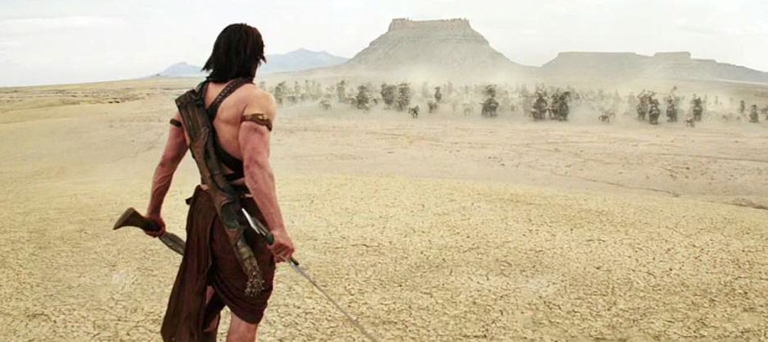
I might entirely misunderstand a couple of subtleties, yet you grasp the point: When unrivaled innovation is within reach, it appears to be ludicrous for legends to restrict themselves to blades. When carriers the size of a city block can drift over a fight, why handicap yourself with mounted force charges including blundering outsider rhinos? When it is feasible to magically transport yourself from Earth to Mars, for what reason would you say you are considered uncommon on the grounds that you can bounce extremely high?
Such inquiries are never posed to in the realm of "John Carter," and thus, the film is more Western than sci-fi. Regardless of whether we totally suspend our doubt and acknowledge the whole story at face esteem, isn't it disappointing to invest such a lot of energy taking a gander at hand-to-hand battle when there are so many slick toys and contraptions to play with?
In any case, I should not survey a film that wasn't made. What we have here is an energizing kid's experience story, adjusted from stories that Edgar Rice Burroughs put out for early mash magazines. They missing the mark on instinctive allure of his Tarzan stories, which motivated an expected 89 films; incredibly, this is the principal John Carter film, however it is planned to encourage an establishment and will presumably succeed.
Burroughs' legend is a Nationwide conflict veteran who winds up in Landmark Valley, where he has an experience that transports him to the red planet Mars. This isn't the Mars that NASA's Meanderers are sticking into, yet the Mars imagined at the time Burroughs was composing, which the cosmologist Percival Lowell guaranteed was confused by an arrangement of trenches. Fortunately for Carter, it has a climate that he can inhale and surface temperatures permitting him manage without a shirt. In a magnificent early scene, he finds that his Earth muscles permit him extraordinary a long ways in the lower Martian gravity.
This draws in the consideration of the occupants of Mars, addressed by two clearly human urban communities at battle with one another, and a local race called the Tharks, who seem to be an obscure humanoid mix of bizarre green outsiders from old fronts of Exciting Marvel Stories. They have four arms, and it was an incredible disillusionment to me that we never saw a Thark getting into a shirt. John Carter feels a prompt proclivity for the Tharks and furthermore gets enrolled into the conflict of the urban communities — picking the side with a red hot excellence named Dejah Thoris (Lynn Collins, who is the film's best person).
John Carter is played by Taylor Kitsch, who co-featured with Collins in "Wolverine." Indeed, I concur Kitsch is an inquisitive name for a star in real life motion pictures. In any case, that is his genuine name, and one can think about the number of enthusiasts of "Wolverine," for instance, are know all about the word or its significance. As an entertainer, he is completely workable as a sword employing, rhino-riding deliverer of planets.
The movie was coordinated by Andrew Stanton, whose credits incorporate "A Bug's Life" (1998), "Tracking down Nemo" (2003) and "WALL-E" (2008). Every one of the three have tight, very much organized plots, and that is what "John Carter" could utilize a greater amount of. The activity groupings are by and large first rate, yet they're an over the top muchness. CGI causes them to appear to be excessively easy and not material enough. Despite the fact that I loved the scene where Carter was getting his Mars legs with his most memorable low-gravity steps, seeing him springing high up like a bouncing jack could move terrible chuckles.